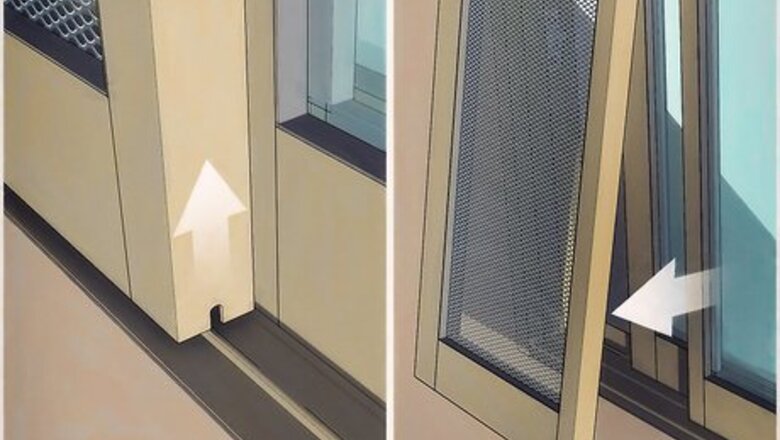
views
Washing the Screen
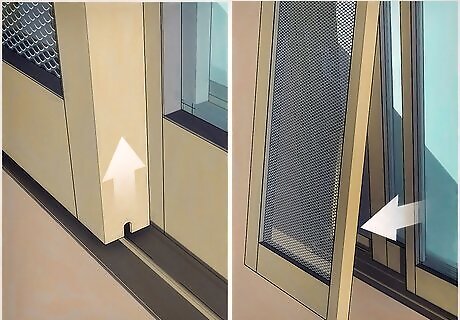
Remove the screen from the window and take it outside. Before you can start washing the window screen, remove it from the window. Removing this screen will make it much easier to wash the screen. Make sure any screen you plan on washing has been removed from the window before you being cleaning it. The exact method you use to remove the screen will depend on the type of window screen you have. Many window screens will have small tabs that are pulled out, releasing the screen from the window frame. Make sure you carefully remove the screen as many window screens can be ripped or torn easily.
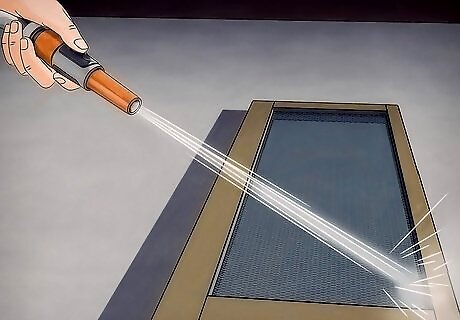
Rinse the screen with a hose to remove any surface dirt. Set your garden hose nozzle to the lowest pressure setting you have to avoid damaging the screen. Rinse off any surface junk by spraying the screen with your garden hose. Make sure you spray the entire screen before scrubbing it down with the cleaning solution. Start at the top of the screen and work your way down, covering the entire screen with water. Flip the screen over to make sure you've sprayed both sides.
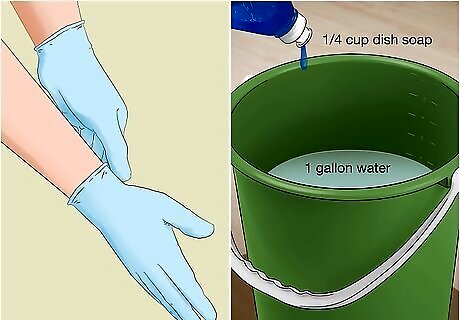
Throw on some rubber gloves and mix a cleaning solution. You have three great options when it comes to cleaning your window screens. Your first option is to mix ⁄4 cup (59 mL) of all-purpose dish soap with 1 gallon (3.8 L) of water. If you want to deodorize the screens in addition to cleaning them, use distilled white vinegar instead of dish soap. If your screens are super filthy, you can use ammonia instead of dish soap or vinegar. Mix your solution in a bucket. Any of these cleaning solutions will work to clean your window screens. If they only need a light cleaning, dish soap will get the job done just fine. Ammonia can be toxic, so keep it off of your skin and make sure you mix your solution outside. Wear a dust mask if you’re especially sensitive to the smell.
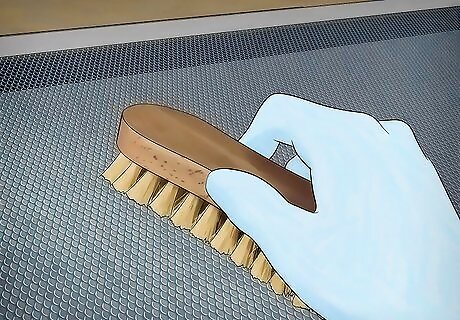
Deep-clean the screen with the cleaning solution and a brush. Dip a soft bristle brush in your cleaning solution. Gently scrub the screen with the brush to break up and remove any troublesome grime and dirt. Scrub the entire screen to make sure you've removed as much dirt as possible. Don’t forget about scrubbing both sides! Try to use small, circular scrubbing motions. Scrub the screen gently. Being too forceful can tear the screen. Rinse the brush off while you are a cleaning to avoid reapplying dirt to the screen. You can use a toothbrush if you don’t have a soft bristle brush on hand.
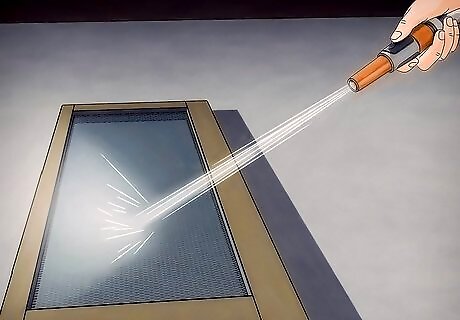
Rinse the screen down again to remove the cleaning solution. Once you’ve scrubbed off all of the junk on your screen, rinse your screen with the hose. This will remove the cleaning solution and any gunk that’s still sticking to the screen. Make sure you've totally rinsed the screen off before letting it dry and reinstalling it. Do not use a high pressure or high power setting on the hose. Make sure you have sprayed the entire screen down by rinsing both sides.
Drying and Replacing the Screen
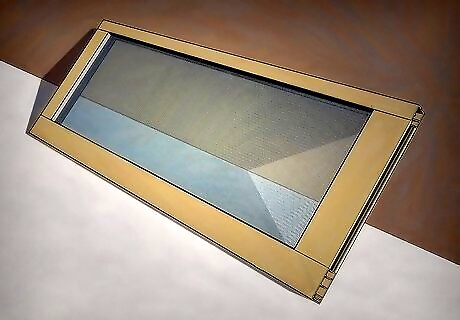
Leave the screen out in the sun for a few hours to air dry. Once you’re happy with the way the screen looks, give it plenty of time to air dry. Just prop the screen up against a wall and wait a bit. It should dry out it 2-3 hours. You can wipe the screen dry with a cloth if you’re in a huge rush, but it can be hard to fully dry mesh screens by hand.
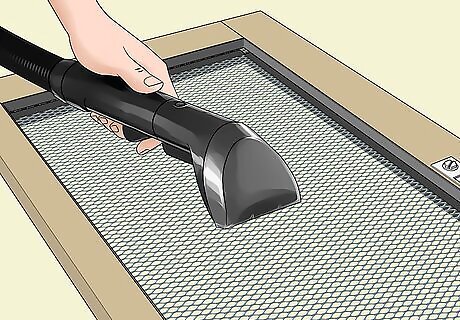
Vacuum the screen once it’s dry to pick up any loose dirt. Once your screen is completely dry, throw a soft bristle attachment on your vacuum hose. Turn the vacuum on and run the hose over both sides of the screen. This will pull up any small dirt and dust particles that are still sticking to your screen. If you’re happy with the way your screen looks once it has air dried, feel free to skip the vacuuming. It will make a big difference on those softer mesh screens, though!

Reinstall the window screen. Once the screen is dry and you're happy with the way it looks, it's time to put it back in the window frame. Replacing the screen can be done by reversing the steps you took to remove it. Make sure the screen is securely in place to complete your window screen cleaning project.
Keeping the Screen Clean
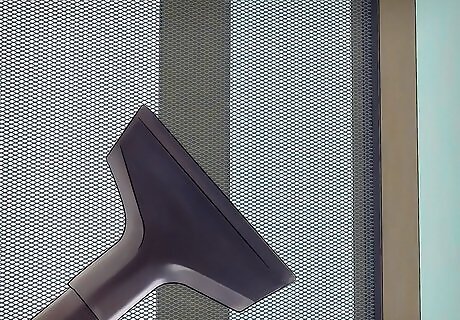
Remove dust at least once a week. To keep your screens continue looking great, give them a light dusting once a week. This will cut down on the amount of heavy cleaning you'll need to do in the future. The easiest way to remove dust from window screens is to use a lint roller, but you can use a regular duster or vacuum if you prefer. It's best to work top to bottom when you’re dusting the screen.
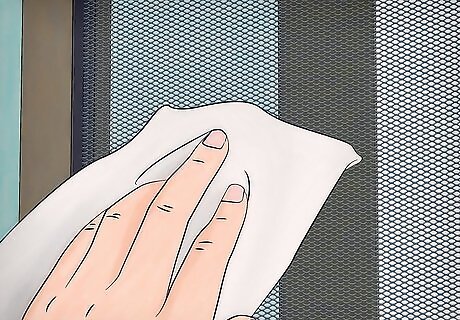
Spot-clean the screen as needed. You won't always need to remove the entire screen from the window to clean it. If you notice a specific spot or area that is dirty, you can mix up some soap and water and clean your screen with a washcloth, sponge, or brush. Keep some of these tips in mind to spot clean the screen while it's still in the window: Mix some mild soap and warm water in a bucket. Dip a small sponge or washcloth into the bucket. Use the sponge or washcloth to gently wash the stained area. If you have to scrub the area, do so gently. Using too much force can easily tear the screen. Finish by drying the spot off with a towel.
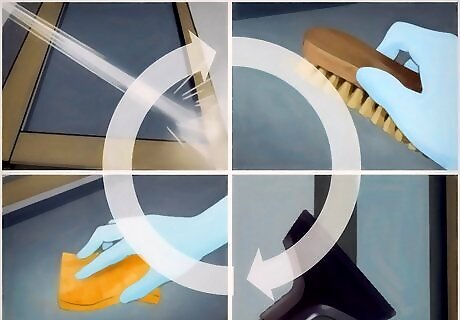
Clean your screens regularly. The more often you clean your window screens, the less often you'll need to remove them and do a full cleaning. Try to include window screens in your usual house cleaning routine to help keep them looking like new.



















Comments
0 comment